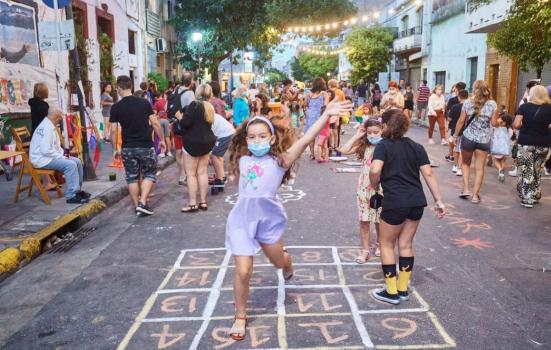A new report from King’s College London and the World Cities Culture Forum looks at the role of cultural policy in shaping urban futures. Jonathan Gross, one of the researchers, shares its key findings.

Courtesy and © Ministry of Culture of the City of Buenos Aires
Covid had devastating effects on cities around the world. Alongside the loss of life and health, the pandemic had a wide range of socio-economic consequences for urban communities, including damaging impacts on cultural life.
While researchers have examined the effects of the pandemic on culture, much less is understood about how urban policymakers actively intervened. And even less is known about the enduring consequences of their responses for the future of post-Covid cities.
So researchers at King’s College London collaborated with the World Cities Culture Forum - a network of civic leaders from more than 40 cities across six continents whose leaders share ideas and solutions to meet pressing global challenges.
Their research investigated how city policymakers responded to the pandemic, and what the consequences might be for the future. The findings are published in a new report: Creative Recovery? The Role of Cultural Policy in Shaping Post-COVID Urban Futures.
Design District Hong Kong © 2021 Hong Kong Design Centre
Key findings: mitigation, recovery and experimentation
Analysing extensive data – including over 270 policy responses from across the forum, alongside focus groups and a survey – the report summarises five key findings.
Firstly, we found two phases of response: mitigation and recovery. Mitigation included measures such as emergency financial support for cultural organisations and artists. Once the emergency phase was navigated, cities undertook recovery responses, looking to the future.
"I’d love our city manager to say, ‘I’m appointing a czar of doing things differently’."
The two were often closely connected with many instances of emergency initiatives becoming the basis for building back better. In some cities, new ways of collaborating with communities, organisations and individuals – made necessary by the public health emergency – will be sustained.
In Buenos Aires, for instance, policymakers developed re-opening policies through almost daily conversations with cultural venues and cultural workers. As a result, new relationships with the sector were formed that became central to future-focused recovery measures.
A second finding was the opportunities for policy experimentation. Amid enormous difficulties and losses, city policymakers appreciated being forced to review ways of doing things – with many experiencing greater freedom to develop ideas and act at speed.
A question raised by many was how to maintain the momentum of these exceptional periods of policy entrepreneurship and innovation? A respondent from Austin, for example, commented they would like policymaking conditions during the pandemic to be continued: “I’d love our city manager to say, ‘I’m appointing a czar of doing things differently’. […] Let’s bring that commitment into an operational model where we can actually see what we did during that pandemic, bring it forward, continue to do it."
Key findings: expansion, partnership and hope
Our third finding was that the scope of urban cultural policy expanded. Some cities undertook rapid mapping of their cultural ecosystem and were forced to ask whose needs they should meet. For example, who counts as a creative worker? And which grassroots organisations should be supported? In many cases, city culture teams supported a wider range of communities, organisations and individuals than previously.
The pandemic also demanded shifts to the local, with some three-quarters of survey respondents working with local communities in new ways. Yet city centres continue to be very important, with initiatives such as the £7m Let’s Do London campaign specifically targeted at reviving central locations.
"Amid the terrible losses, policymakers undertook concrete practices of hope."
Fourthly we found that, in responding to the challenges of the pandemic, partnerships and networks really mattered. As in Buenos Aries, policymakers developed new interactions with an expanded range of partners in their cities. They also drew vital support from city policymakers internationally, including through the forum itself.
Finally, amid the terrible losses, policymakers undertook concrete practices of hope: actively looking towards positive futures. Barcelona, for example, bid to host an international biennale, to mobilise people around a future project. In several cities public art was commissioned which, as one Toronto policymaker explained, brought “hope and messages of solidarity and support […] into the public realm”.
In the survey there were many losses, including seven in ten reporting decreases in vitality and vibrancy of city centres. But around two-thirds felt the cultural sector would be better off in the longer term, compared to before Covid. Most indicated the pandemic provided an impetus to do things differently and build back better, with art having an important regenerative role to play in post-Covid city-making.
Piazze Aperte a Dergano © Michela Laudadio, Image Courtesy of the City of Milan
What are the implications?
Justine Simons, London’s Deputy Mayor for Culture & the Creative Industries, says: “The pandemic had a devastating impact on culture, but this report show how cities across the globe worked together to safeguard and support these vital industries. It reveals how culture has become ever more central in plans for recovery, encouraging people back into city centres, driving tourism and growing jobs. City leaders became entrepreneurs quickly designing innovative solutions, some of which will remain in our cities forever.",
The research was concerned not only with what happened but also with the implications for the future, of which we identified five. Firstly, to imagine and develop post-Covid urban futures, policymakers need to extend time horizons beyond crisis management and the short-termism of typical policy cycles.
Closely connected, supportive external partnerships and networks can assist policymakers to creatively develop possible futures - not only by sharing ideas, but also by helping each other protect the space to think beyond the short-term.
Thirdly, our research highlights the vital importance of effective processes for identifying citizens’ needs via public consultations, conversations and deliberations. These may address immediate needs during a time of crisis but also have the potential to involve citizens in sustained processes of developing possible futures for their city.
Cultural recovery still an open question
Fourthly, urban cultural policymakers need to develop effective approaches to uncertainty. The future is inherently uncertain, and the pandemic made the importance of contingency planning even clearer. It also demonstrated the value of supporting collective hope – taking practical steps for imagining positive futures.
Finally, as pre-Covid policy processes reassert themselves, it will be important to ensure shared recollection that things were done differently and could be done differently in the future.
World Cities Culture Forum Director, Laia Gasch says: “Throughout the pandemic, our city leaders came together to exchange solutions and learn from one another as we faced unprecedented challenges. The ties between cities were reinforced and the support of the forum allowed our cities to respond rapidly to the crisis by sharing the best ideas.”
As we write at the end of the Creative Recovery? report, there are many possible futures for urban cultural policy post-Covid. In the aftermath of the pandemic, there are both challenges and opportunities for innovative, democratic processes of city cultural policymaking. Whether it has been a creative recovery is an open question – the answer to which will be shaped over the coming months and years.
Dr Jonathan Gross is a Lecturer in Culture, Media & Creative Industries at King’s College London.
![]() kcl.ac.uk/people/jonathan-gross | worldcitiescultureforum.com
kcl.ac.uk/people/jonathan-gross | worldcitiescultureforum.com
![]() @King'sCMCI | @wccforum | @JontyGross | @LaiaGasch
@King'sCMCI | @wccforum | @JontyGross | @LaiaGasch
You can watch the online report launch from 5th July 2023 here: Creative Recovery? The Role of Cultural Policy in Shaping Post-COVID Urban Futures (worldcitiescultureforum.com)




